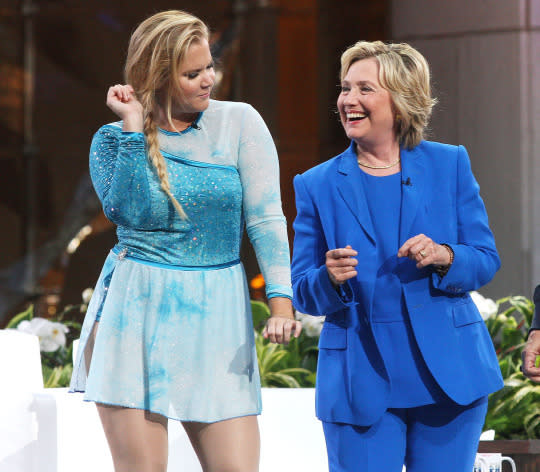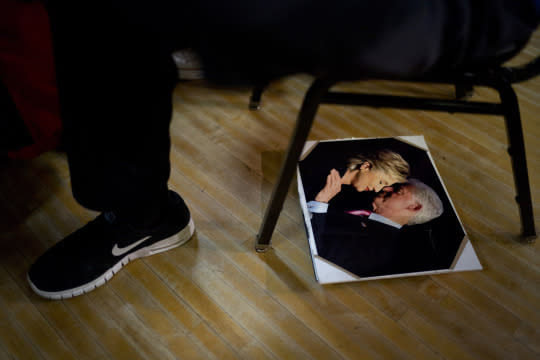Hillary, Lena and Amy: Sisterhood is powerful, or so Clinton hopes

Amy Schumer and Hillary Clinton attend “The Ellen DeGeneres Show” Season 13 Bi-Coastal Premiere at Rockefeller Center on Sept. 8, 2015, in New York City. (Photo: Laura Cavanaugh/FilmMagic)
The Hillary Clinton of 2008 talked a lot about her qualifications and background as a lawyer, a United States senator, a first lady, a children’s rights advocate — and very little about the fact that she’s a woman. Even if she’d had a grandchild at the time, she probably wouldn’t have been photographed pushing a baby carriage. If she’d been delayed returning from the bathroom during a debate break, she would have trampled three interns and a cameraman to get back to the stage in time.
The Hillary Clinton of 2016, in stark contrast, is a proud grandmother, confidently exercising her right to let the world wait for her, and above all, unafraid to acknowledge that in running she is making it possible for “fathers … to say to their daughters, ‘You, too, can grow up to be president.’”

A pregnant Chelsea Clinton heads out for a family day walk with her parents, Hillary and Bill Clinton, along with her husband, Marc Mezvinsky, and their baby Charlotte. (Photo: Splash News)
So, what happened?
Lena Dunham happened. And Amy Schumer. Also Sheryl Sandberg, Gabby Giffords, the first female Army Rangers and all of women’s soccer. All assessed in polls, discussed in strategy sessions with her aides and all pointing to the same conclusion: that if the United States is ready to see Julia Louis-Dreyfus as president, it’s ready to elect Hillary Clinton. And, of course, something else happened: Donald Trump.
“The cultural moment is different for a female candidate for president than the one that existed as recently as seven years ago,” says Howard Wolfson, co-chief strategist and communications director for Clinton’s 2008 presidential campaign, who now works for Bloomberg and is watching this one from the sidelines.
“There was no equivalent of a show like Girls with a frank depiction of what it means to be female,” he said. “There was no young woman carrying around the mattress at Columbia talking about issues of sexual violence, no Sheryl Sandberg pointing out that women are perceived differently when it comes to leadership, no Amy Schumer with a pop comedy show devoted to exposing sexism in the workplace and society. There is much more space for a conversation around gender discrimination and gender equality and just plain gender.”
Eight years ago, he says, the goal of the campaign was to prove that Clinton could win the election and do the job of president. Hence, “the fact that the candidate was female was not something we stressed.”
“When she first announced the last time, we spent at least six to eight months asking, ‘Is America ready for a female president?’” recalls Donna Brazile, a longtime Democratic strategist who is now a commentator for CNN. “In light of all that, [the campaign] decided not to emphasize that she would be the first woman, rather they thought that her qualifications as commander in chief was the most important ingredient. They wanted to neutralize the gender card as much as possible.”
That might have been a misread of the electorate, Brazile and Wolfson now admit. The two most powerful images of Clinton’s last presidential run were when she cried in a New Hampshire diner and when she exited with a speech that took pride in the “18 million cracks” her candidacy had created in “the glass ceiling.” Or maybe in the long run it was the correct decision, and the reputation for toughness she cultivated then, reinforced by her subsequent tenure as Secretary of State, settled the question of her competence — freeing her to present herself now as a woman whose campaign carries as much symbolic weight for women as President Obama’s did for African-Americans.
Her embrace of the w word can be seen in her emphasis on subjects that might be seen as “women’s issues,” such as pay equity, reproductive health and research for autism and Alzheimer’s disease. It also is reflected in the frequency with which she says some variation of “Being the first woman president would be quite a change from the presidents we’ve had” (a quip from the October Democratic debate) or “I may not be the youngest candidate in this race, but I will be the youngest woman president in the history of the United States” (at a recent campaign event in New York).
“She’s embracing not only being a woman but also her activism around women’s issues,” says Hilary Rosen, a democratic strategist. “She’s campaigning in a way that shows she’s more confident in her own skin.”
Still, the difference between then and now is not just this change in content and confidence, but also one of context — not just a difference in the message she sends, but the way it is heard. “Not only has she changed, but also society and culture have changed,” Rosen says. In a virtuous circle, the culture shapes the candidate, who in turn reflects the culture: in sports (think Serena Williams and Abby Wambach), in business (Sheryl Sandberg), in advocacy (Malala Yousafzai, Gabby Giffords), pop culture (Lena Dunham, Amy Schumer, etc.).
There were women in these realms eight years ago, of course, but their greater numbers and visibility have arguably conditioned Americans to the idea of a woman who is unapologetic about her strength or her femaleness. Sandberg provided the roadmap in her best-seller “Lean In,” in which she deconstructed the cultural reality that women must be seen as likeable in order to be seen as competent.

From left: Girls producer Stacey Reiss, Hillary Clinton and Lena Dunham.
(Photo: Barbara Kinney/HillaryClinton.com)
Enter Lena Dunham. The creator, writer, director and star of HBO’s “Girls” and the spirit animal for many a millennial woman is an outspoken Clinton supporter, and Clinton is a fan. When Dunham launched her wildly popular Lenny newsletter last year, Clinton was the first interview, and when Dunham asked “Do you consider yourself a feminist?” the Secretary responded, “Yes. Absolutely.”
Dunham has since appeared in Clinton campaign ads and spoken at Clinton rallies, usually about the candidate’s experience as a trailblazer for women’s rights, while emphasizing that’s only one of several reasons to support her. “The fact that she has the chance to make history as our first woman president is honestly just the cherry on top,” Dunham told Yahoo News in an interview conducted by email because she was suffering from laryngitis from making too many campaign speeches.
Dunham said she is flattered by the idea that she’s helped shaped the Zeitgeist in a way that is reflected in Clinton’s campaign. “I love that Hillary Clinton has been willing to engage with me, with Amy Schumer, with the girls of Broad City and Another Round, and to embrace a message of feminist engagement that, while Zeitgeist-y, still garners a whole lot of hate from big segments of the population,” she said. “It was a big moment for me, and for so many Lenny readers, when she unequivocally stated that feminism is meaningful to her. I’m glad a big chunk of the world wants to hear that, and I’m glad she said it.”
The new willingness to put gender front and center is not without some risks. Clinton’s would-be Republican opponents have been quick to call her changed openness “playing the woman card.” And lately they have gone even further, with accusations that show the double-edged sword of a rapidly changing cultural context. In this changed environment, where sexual misconduct is no longer winked at, Donald Trump (of all people) has accused Hillary Clinton of enabling Bill Clinton’s adulterous affairs. And Carly Fiorina declared in the last Republican debate that “unlike another woman in the race, I actually love spending time with my husband.”
So far, the campaign’s approach has been to stare down the attacks. Clinton met Trump’s crude jabs about her visit to a bathroom with an eye-rolling “we’re all in this together” insouciance. “If this is playing the gender card,” she says in every stump speech, “then deal me in.”

Secretary of State Hillary Clinton checks her mobile device aboard a military C-17 plane from Malta bound for Tripoli, Libya, in October 2011. (Photo: Kevin Lamarque/Reuters)
It is unclear whether the approach is working. Polls show her popularity with Democratic women fluctuating over the months, at a high of more than 70 percent this past summer, down by nearly 30 points in September and back up to 61 percent a month later. The younger women she hopes to attract by campaigning with Dunham, who joined her in Iowa and New Hampshire last week, or Katy Perry, who was introduced by Bill Clinton in Des Moines, are in danger of being seduced away by Bernie Sanders. Mini Timmaraju, Clinton’s director of women’s outreach, is confident women will stick with Hillary, and her analysis says a lot about how the campaign sees the candidate’s appeal in generational terms.
“Baby boomer women have come up with Hillary; they know her,” Timmaraju says, and they talk more about their desire to see a woman president. Younger women, she says, come with the assumption that a woman will eventually win the office and “are drawn less because of what she represents than because they are passionate about one of the issues she stands for.”
And so Clinton will pursue the presidency on her own terms, running as a candidate who can plausibly lead the most powerful nation on earth, but whose election will make history just by uttering the words, “I, Hillary Rodham Clinton…” If this doesn’t work, if hindsight shows that this too was the wrong approach for the moment, at least it represents a more natural fit with Clinton’s personality and interests.
“If you look at Hillary Clinton’s entire career, from the time she was a young attorney through her years as Secretary of State, she always found a path where she advocated for women and girls,” Timmaraju says.
Says Brazile: “I feel like she’s been removed from some box, that she’s more comfortable and more herself. It’s tough to be the first of anything. The first time around she learned those lessons, and she’s changed.”
She’s also betting that the voters have changed, too.

A photo of former President Bill Clinton and Democratic presidential candidate Hillary Clinton kissing is seen on the floor during a campaign rally with the candidate, Monday, Jan. 11, 2016, in Waterloo, Iowa. (Photo: Jae C. Hong/AP/Corbis)
